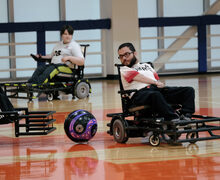Q&A with Mickey Hart, percussionist and former drummer of The Grateful Dead
From the 1960s to the mid-1990s, Mickey Hart was a name known to Deadheads everywhere as the percussionist for the mother of all psychedelic music groups: Grateful Dead. Since his time with the group, Hart expanded his musicality with a 25-album project influenced by music of different cultures around the world. Then, Hart set his sights on the cosmos by producing music from transformed light waves. He will perform his new music at Syracuse’s Westcott Theater on Friday with the Mickey Hart Band. The Daily Orange talked to the percussionist about his latest endeavors, working with Grateful Dead lyricist Robert Hunter and musical therapy.
The Daily Orange: In 2011, Smithsonian Folkways Recordings released the Mickey Hart Collection. Can you explain what that is?
Mickey Hart: That’s the world’s music. That’s my recordings over the many years recording indigenous music from around the world. There’s 25 of them now available at Smithsonian Folkways. But the music we’re making right now is hard to categorize because it’s cosmic. It is more of a universal music as opposed to a global music. I do very little work now sublunar. It is mostly beyond the moon, which is very interesting for me musically.
How and why are you turning light waves into sound waves?
I’m using radio telescopes from around the world to capture the light waves from the epic events of the universe. Stars, planets, galaxies, black holes, all of the amazing epic sounds of the universe, and I transform them into sound waves and music to have a conversation with the universe. So that’s what makes it so exciting. It’s quite an adventure and a very thrilling undertaking.
What gave you the idea to do this?
Well, all of my books that I wrote in the ’90s alluded to the beginning of the universe and the beginning of time and space because that’s where the rhythm was born, of the universe. But in those days there really was no way of accurately reading the light waves, and we didn’t even know when the Big Bang was in 1991. I decided to go back and actually sonify these specific events and turn the light waves because space can’t support sound. It’s a vacuum and the sound won’t travel through space, but light will. And I thought, what does the beginning of the universe, and of time and space, what does it sound like? And so I went back and found out.
Can you talk a little about your collaboration with Robert Hunter, the lyricist for the Grateful Dead, on your new music?
Robert wrote much of the new material. It is beautifully inspired and, you know, he’s a great asset. Writing songs with Robert, it makes my day.
Are you planning on expanding on this cosmic sound in the future?
Yes, I am! I am working with radiation, I am working with DNA, and I am working on a cellular level with stem cells. Of course I am in love with sound. Sound explains a lot of things about a lot of things. The world can be explained by vibrations, so it explains a lot about life, about the universe and your place in it. It is a very interesting field of study, sonification, and I am into it up to my ear balls.
Proceeds from the show’s ticket sales are going to funding music therapy. Is this something that is important to you?
Yes. I believe that music has innate powers that we are not totally in control of or aware of. It has healing powers. The money will go into research and music therapy and people in hospitals and hospices, using music as a healing agent. That’s my big interest. That has always been the overriding interest in my life — how music enhances life.
Published on January 5, 2012 at 12:00 pm
Contact Chelsea: [email protected] | @CDeBaise124




